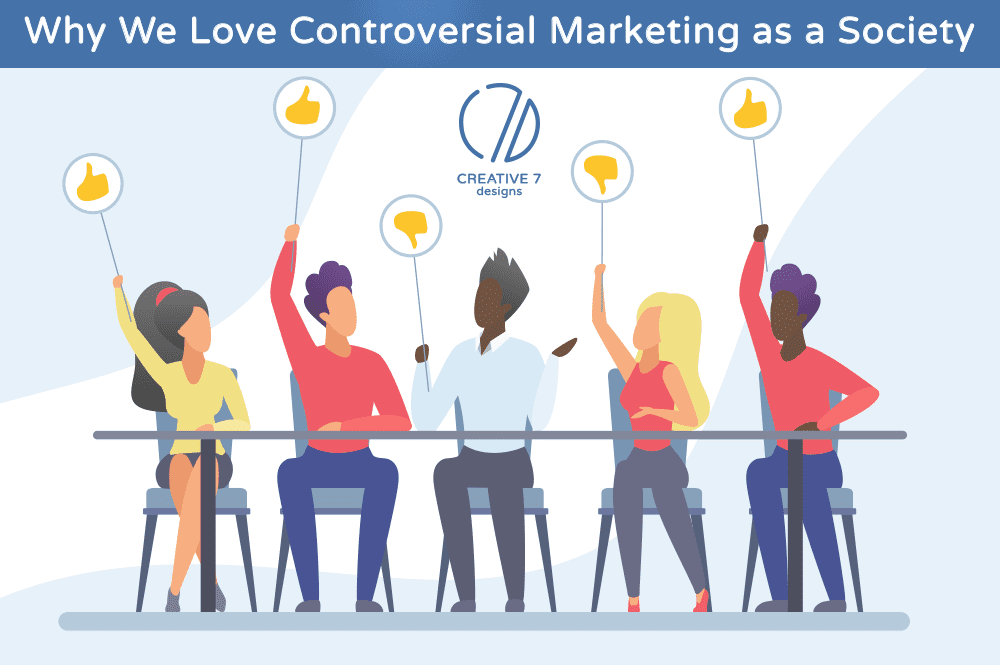Overview: Find out if there’s a psychology behind the media spewing out controversial topics… and our inclination to gobble it up like a Thanksgiving feast.
Don’t feel ashamed if you’ve clicked on a news article or watched a video before just because its controversy piqued your interest. We’ve all been there. Is there a reason controversial marketing seems to work, though?
We’ve talked about controversial marketing before, highlighting opinions from authoritative sites like Forbes and giving pointers on how to implement it tactfully.
» READ MORE: The Ultimate Guide to 2022 Marketing Trends (Part I)
More often than not, we find ourselves unexpectedly clicking on that viral video of someone embarrassing themselves or that news article exploiting the divorce of our favorite celebrity couple. So we believe it’s more than sheer curiosity.
Do you think we can figure out the psychology behind our lust for the controversial? Let’s trek through the mysterious yet intriguing universe of this modern-day marketing trend.
THE CONNECTION BETWEEN HUMANS, CONTROVERSY, & CHAOS:
Controversy does three things:
• 1) It makes things more interesting to talk about. It’s pretty boring if everyone has the same opinion, so a little bit of dispute keeps the discussion stimulating. People get to voice their opinions, and the debate can encourage conversation.
• 2) It generates discomfort. Particularly if you don’t know people that well, you don’t want to offend them. People care what others think of them. So, many avoid talking about highly-controversial things openly to avoid rubbing others the wrong way… or in the world where rubbing others the wrong way seems to be the thing to do, people will invite highly-controversial discussions.
• 3) It is an attention grabber. The effect of controversy depends a lot on what’s being discussed. If you’re trying to sell a product, for example, and the whole market talks about it (who cares if it is negative? They know your product. That’s enough!) then you have done your job. People will eventually forget the controversy but not your product. But we’ll talk more about the unique relationship between controvery and marketing in a bit.
Back in 2016, Topper writer Sanjana Kulkarnan posted an article on the website where she shared her thoughts on humans and what seems to be our natural attraction toward controversy.
“Why do we stop by on the road to look at a fight?” she asked. “Obviously, we are not going to help them out. We stare at them for some time, give them a disgusting look and then, move on.”
This scenario she presented was well-founded (and trust us… this has more to do with marketing than you realize).
» READ MORE: Why Do We Love Controversies?
HOW SOCIAL MEDIA HAS FUELED CONTROVERSY:
Humans are constantly bombarded with numerous marketing offers to grab their attention — be it on desktop, mobile phone, in the mailbox, through text message, or video ads.
As the world continues to move toward fast-paced and choppy “socializing” through social media, it’s no surprise why humans are prone to chaos and controversies. Why?
Because in order to gain your audience’s attention, you’ll need more than a plain click-bait headline.
If you’re wondering how to cut through the noise, take a loop & make your brand message stand out, controversial marketing is a trend that likely isn’t going away anytime soon. And creating it requires tact so that you can incite the right conversations on social media discussion and create the right buzz offline, too.
WHAT IS CONTROVERSIAL MARKETING:
Controversial marketing refers to intentionally designing promotional content to stand out as a controversy.
The first advantage of controversial marketing is simply that it increases brand visibility which, in turn, helps to generate revenue.
With more businesses emerging now more than ever, it’s becoming a challenge to stand out. This marketing tactic is important because it helps businesses stay afloat in the constant-evolving world of digital marketing.
Start-ups, for example, need to develop unique ideas to beat already-established businesses. While many routes can take you there, controversial marketing is one of the easiest ways to receive attention — even from audiences far beyond your target reach.
The second advantage of controversial marketing is that it gives birth to discussion, debate, and a buzz around your brand.
What happens when people get to talking about your brand or product? It generates conversations and naturally evokes emotions. Although it’s a high-risk tactic, controversial marketing almost guarantees you more than the attention you are looking for — even if it isn’t all the right attention.
EXAMPLES OF PRODUCTS & BUSINESSES ASSOCIATED WITH CONTROVERSIAL MARKETING:
Marketing is the backbone of brands that can make or break a brand and has a primary purpose to stir up audience emotions enough for them to act — make that purchase, register for that thing, donate there. However, the basic purpose behind controversial marketing is to create chaos. This may include:
– Challenging the law and traditions
– Using vulgar or sexual content to draw attention to social codes or the like
– Promoting ideas that might be unconventional or unpopular
The list truly goes on. Let’s take a look at some brands that benefitted by implementing controversial marketing into their campaigns.
1. KFC – IT’S FINGER LICKING GOOD:
Loved widely for its fried chicken, KFC received a backlash over its campaign in China in 1980. KFC was opening its outlet worldwide, and perhaps their marketing research or copywriting team was too naive; they didn’t focus on the iconic slogan “it’s finger-licking good,” which translated to “good to eat your fingers off.”
This slogan was rendered as an indication of cannibalism, shame, and a sick message from a food chain. Unbeknownst to the brand’s meaning and language barrier, KFC jumped in, accepted its mistake, and offered amends.
And, needless to say, whether people believed KFC was promoting cannibalism or not, the company garnered a lot of attention with that advertisement.
2. REDBULL GIVES YOU WINGS:
In 2014, this energy drink company was sued for the controversial slogan, “Red Bull gives you wings” when Beganin Caraethers (one of the regular customers) took the meaning literally and sued the company by claiming that he consumed the energy drink for over 10 years but hadn’t developed any wings or supernatural powers.
We know that the company claimed that consumption of this carbonated drink would help the drinker have better concentration and increase reaction speed, but news of Caraethers stirred the headlines.
This controversy brought the brand to people’s notice, leading to a significant increase in revenue than expected.
3. OLAY ANTI AGING:
In 2019, Olay came under fire for an advertisement of an eye cream that featured Twiggy, supermodel who looked like an utterly wrinkle-free, younger version of her actual self.
It was stated that the ad was digitally retouched to promote fake beauty standards and misleading impressions; it also resulted in generating revenue and bringing to notice every single lady who didn’t like her wrinkles. Interesting, to say the least.
CAN YOUR BUSINESS BENEFIT FROM IMPLEMENTING CONTROVERSIAL MARKETING:
Brands try to avoid controversies to keep themselves safe; however, we’ve seen that these controversies can have both positive and negative sides. If you’re still curious about the controversial marketing craze, here are some things you can think about:
Controversy get s people talking:
Controversial marketing is a conversation starter, be it for the right or wrong reasons. This is especially true in a modernly digitized world where everyone has access to the internet and social media platforms to voice their views. This also makes controversial content ultra-shareable, with the high chance to go viral.
Controversy can boost sales/increase revenue:
Campaigns that are met with extreme criticism generate more sales than casual ones. For instance, while Protein World’s “Are you Beach Body Ready?” campaign for their weight loss collections sparked public outrage after being accused of body shaming and sexism, it managed to report £1 million profit against the £250,000 marketing income.
IN SUMMARY:
We’re also not saying to go out and body shame or be sexist. But what we are saying is that controversial marketing might be for you.
If you want to try your shot at viral-induced revenue growth, establish a marketing strategy to implement some marketing that could spark conversations and make people feel a bit uncomfortable (but not too uncomfortable).
The last thing you want is to put out a message that your brand simply doesn’t support, so also make sure that the controversial topic you’re covering is an honest reflection of your brand’s overall message.







